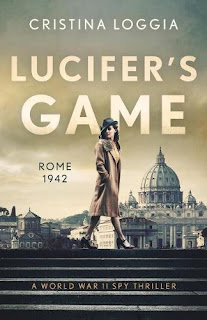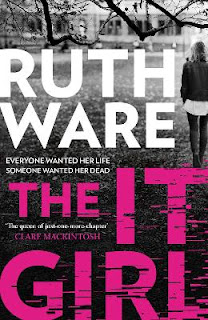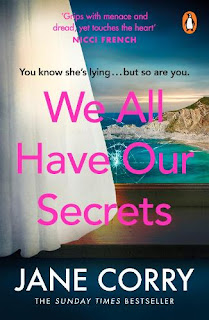Meet Cristina Loggia Author Of Lucifer's Game
Audiobooks are an increasingly popular way to get your thriller fix, and can make books more accessible to disabled people as well as being very convenient for long car journeys!
To celebrate the audiobook release of Cristina Loggia's WW2 thriller Lucifer's Game this month, she reveals the inspiration behind the novel, her personal connection to Italy and how planning helps her writing - including lots of research.
Listen to Lucifer's Game on Scribd.
TW: Lucifer's Game is a WW2 spy thriller set in Rome in 1942. Tell us more about why you wanted to write about the war in Italy, military secrets whilst also incorporating a love story?
CL: I am passionate about WW2 and over the years I read many history books on this terrible conflict. I chose Italy as the location for my novel because it had been a geopolitically pivotal country during the WW2, and the simple fact that Churchill famously described it as the ‘soft underbelly of the Axis’ was indeed quite significant. I also thought Italy and fascism had not been chosen that often as a setting for a story: so much happened there that I thought it was worth telling.
Part of the inspiration for Lucifer’s Game also came from a fascinating account about deception during WW2, which mentioned a number of English spies operating in Benito Mussolini’s fascist Italy. Documents showed that one of these spies at some point got a message from London congratulating him for his work in stopping Erwin Rommel in North Africa – it’s worth remembering that Rommel was a formidable German general that almost defeated the Allies in that part of the world, which would have been an absolute catastrophe for them. I was intrigued! How did this spy manage to do it? How could this have happened?
I combined this initial idea with the countless stories that my grandfathers, who fought in the war, told me as a child, which were quite dramatic – they both came face-to-face with the Germans, with one ending up in a concentration camp and the other thrown in jail. I added a love story as history is made by people. People have passions, and those passions often drive their actions. People are human, at all times, despite their circumstances. I wanted this dimension to be present in my story in a powerful way.
TW: With a Jewish mother, Cordelia Olivieri is trying to secure safe passage out of Rome. What was your inspiration for Cordelia's character?
CL: I wanted to portray a woman as a central character, for a start. Women had been fighting their own battles on the home front during the war, and in some parts of the world, like in Italy, the war came knocking directly on the door. I wanted to portray somebody who suddenly has her world turned upside down, finds herself alone and with a country that has turned against her, simply because of her racial origin. Ultimately, I wanted to showcase that even in the most difficult circumstances, people always have a choice: flee or fight. Doing nothing is the easiest thing to do. Cordelia, instead, chooses to fight back and help, because she can, because she believes it was the right thing to do, because of her nature. She is not only driven by the personal circumstances she finds herself in, her choice is down to who she is, what she thinks, and how far she is prepared to go to achieve it. Even the smallest thing can have a significant impact. And that’s the case in Lucifer’s Game.
TW; How much research went into Lucifer's Game and how long did that process take? Was it hard to balance the level of detail that ended up in the novel?
CL: I read lots of history books over many years, and if I have to quantify how much that would take specifically for a novel with WW2 as a backdrop, I would say approximately three to six months – depending on the level of depth you want to achieve. But the research didn’t stop there. It continued during my writing as well. I found myself asking questions like: what did people eat at the time? What sort of rations did the Afrika Korps had in North Africa? What sort of transport was available in Italy in the early 40s? What car models? What was the most popular song? Such elements, which belong to everyday life, are not all in history books, so I had to look for them in more specialised sources, which was great fun! I believe it was essential to add a more human dimension, even if it took extra time, because those details add authenticity to the story, give a sense of place and time, of how ordinary people lived. Sometimes you are tempted to put so much in, but I hope I managed to keep details functional to the story and to an essential and enjoyable level for the reader.
TW: How long did it take you to finish the first draft?
CL: It took me about nine months. I wrote an average eight hours a day – so all day really, it was a full time job! Then another month and a half editing the initial draft. I usually spent the morning doing my historical research, checking facts, dates, places. Then the rest of the day writing – and re-writing! It has been a very intense process, the hardest thing I’ve done. But the most rewarding, for sure.
TW; Did you map out the plot of Lucifer's Game in advance? Are you a plotter or a 'pantser'?
CL: I am a great planner, so I plotted the story from start to finish. I wanted to know how it started and ended, so that every twist and turn made sense, that the story didn’t have any holes or dead ends, and pace was right. Because Lucifer’s Game a thriller, most of all I wanted to keep readers engaged, on the edge of their seats at all times, eager to turn to the next page. Having said that, I had lots of additional ideas along the way and some things slightly changed, although the overall concept and outcome remained the same. I have to say that the details of the final chapter came to me towards the very end. So, although a plan can be set in stone, that stone can be further sculpted, if you like!
TW: The audio book is out now. Tell us more about that. Who narrates it?
CL: Lucifer’s Game had such an unexpected success that, although I am a debut author, it was a no-brainer to decide to make it available as an audio book as well. I am glad that this new technology has allowed people, who may have difficulties reading because of various disabilities, to have the same opportunity to enjoy books by listening to them. And also, it’s becoming popular among the reading community too. You have just to sit back and relax!
CL: I wanted to portray a woman as a central character, for a start. Women had been fighting their own battles on the home front during the war, and in some parts of the world, like in Italy, the war came knocking directly on the door. I wanted to portray somebody who suddenly has her world turned upside down, finds herself alone and with a country that has turned against her, simply because of her racial origin. Ultimately, I wanted to showcase that even in the most difficult circumstances, people always have a choice: flee or fight. Doing nothing is the easiest thing to do. Cordelia, instead, chooses to fight back and help, because she can, because she believes it was the right thing to do, because of her nature. She is not only driven by the personal circumstances she finds herself in, her choice is down to who she is, what she thinks, and how far she is prepared to go to achieve it. Even the smallest thing can have a significant impact. And that’s the case in Lucifer’s Game.
TW; How much research went into Lucifer's Game and how long did that process take? Was it hard to balance the level of detail that ended up in the novel?
CL: I read lots of history books over many years, and if I have to quantify how much that would take specifically for a novel with WW2 as a backdrop, I would say approximately three to six months – depending on the level of depth you want to achieve. But the research didn’t stop there. It continued during my writing as well. I found myself asking questions like: what did people eat at the time? What sort of rations did the Afrika Korps had in North Africa? What sort of transport was available in Italy in the early 40s? What car models? What was the most popular song? Such elements, which belong to everyday life, are not all in history books, so I had to look for them in more specialised sources, which was great fun! I believe it was essential to add a more human dimension, even if it took extra time, because those details add authenticity to the story, give a sense of place and time, of how ordinary people lived. Sometimes you are tempted to put so much in, but I hope I managed to keep details functional to the story and to an essential and enjoyable level for the reader.
TW: How long did it take you to finish the first draft?
CL: It took me about nine months. I wrote an average eight hours a day – so all day really, it was a full time job! Then another month and a half editing the initial draft. I usually spent the morning doing my historical research, checking facts, dates, places. Then the rest of the day writing – and re-writing! It has been a very intense process, the hardest thing I’ve done. But the most rewarding, for sure.
TW; Did you map out the plot of Lucifer's Game in advance? Are you a plotter or a 'pantser'?
CL: I am a great planner, so I plotted the story from start to finish. I wanted to know how it started and ended, so that every twist and turn made sense, that the story didn’t have any holes or dead ends, and pace was right. Because Lucifer’s Game a thriller, most of all I wanted to keep readers engaged, on the edge of their seats at all times, eager to turn to the next page. Having said that, I had lots of additional ideas along the way and some things slightly changed, although the overall concept and outcome remained the same. I have to say that the details of the final chapter came to me towards the very end. So, although a plan can be set in stone, that stone can be further sculpted, if you like!
TW: The audio book is out now. Tell us more about that. Who narrates it?
CL: Lucifer’s Game had such an unexpected success that, although I am a debut author, it was a no-brainer to decide to make it available as an audio book as well. I am glad that this new technology has allowed people, who may have difficulties reading because of various disabilities, to have the same opportunity to enjoy books by listening to them. And also, it’s becoming popular among the reading community too. You have just to sit back and relax!
I have to say that, as a child, I loved listening to Disney novels released on record. It’s a different experience even for someone who has already read the book, because narrators add that extra human dimension to the story. Rachel Capell is the talented actress who narrates Lucifer’s Game. I chose her among many artists for her incredibly warm voice, her tone is just perfect for storytelling. Rachel had the ability to take the story to a whole new level, making it so much more real. But also, she gave each character such a distinctive individuality, her interpretation is spot on and indeed very evocative. An absolute pleasure to listen to and to work with.
TW: Tell us a little about your connection to Italy and how that has shaped your ideas.
CL: I was born in Piedmont, in North-West Italy. My family has been in wool trading for generations. My grandfather, though, developed a keen interest and a passion for movies. So, he decided to build a cinema in his village during the WW2.
TW: Tell us a little about your connection to Italy and how that has shaped your ideas.
CL: I was born in Piedmont, in North-West Italy. My family has been in wool trading for generations. My grandfather, though, developed a keen interest and a passion for movies. So, he decided to build a cinema in his village during the WW2.
As a child I spent all weekends watching films. I think this influenced in part what or how I write: I see the story in my mind before writing it, and somehow that makes it an easier task since I just need to put on paper what I see in my mind. My ideas were also shaped by my love of history and the particular passion I developed for WW2. Italy was a battleground during that conflict, it saw firsthand the struggle between the Axis forces – the Nazis and the fascists – and the Allies – the British and American armies, mainly: signs are still there, on the walls, in people’s minds, in family histories and stories. You can’t ignore that, or at least, I couldn’t. Lucifer’s Game has elements inspired by my family’s personal history and true events, they are its building blocks: even if it is just a fictional imitation of life, I hope it helps reminding us all of a past that should never be forgotten.
TW: What's next for Cristina Loggia?
CL: I have almost finished writing my second novel. It’s another historical thriller. And I am very excited about it! I have lots of other ideas, so more books on the cards. I hope to become a full time writer and earn a living from my work.
TW: What novels do you read for pleasure? What are your favourites?
CL: Thrillers and spy stories, mostly, as I am an adrenaline junkie! But also historical fiction, together with crime novels. In terms of authors, Ian Fleming is a favourite of mine, for sure! I was swept away when I read Dr. No, such a great story! I read all of his books. Then Ken Follett, William Shakespeare, Sidney Sheldon, Robert Lewis Stevenson, William Goldman, are my top picks.
Quick fire questions:
TW: Espresso or Cappuccino?
TW: What's next for Cristina Loggia?
CL: I have almost finished writing my second novel. It’s another historical thriller. And I am very excited about it! I have lots of other ideas, so more books on the cards. I hope to become a full time writer and earn a living from my work.
TW: What novels do you read for pleasure? What are your favourites?
CL: Thrillers and spy stories, mostly, as I am an adrenaline junkie! But also historical fiction, together with crime novels. In terms of authors, Ian Fleming is a favourite of mine, for sure! I was swept away when I read Dr. No, such a great story! I read all of his books. Then Ken Follett, William Shakespeare, Sidney Sheldon, Robert Lewis Stevenson, William Goldman, are my top picks.
Quick fire questions:
TW: Espresso or Cappuccino?
CL: Espresso, black and sweet.
TW: Aperitivo or a trip to the pub?
CL: Aperitivo, absolutely!
TW: Pizza or pasta?
CL:Pizza.
TW: Leather boots or leather sandals?
CL: Leather sandals.
TW: Gelato or Tiramisu?
CL: Tiramisu any time of the year!
TW: Milan or Rome?
CL: Rome, it’s such an infinite pleasure to visit.
Thanks Cristina!
Rome, 1942. Cordelia Olivieri is a young, determined hotel owner desperate to escape Mussolini’s racial persecution. But as Fascist leaders gather in Rome, Cordelia is suddenly surrounded by the world’s most ruthless and powerful commanders.
In an effort to keep her Jewish heritage a secret and secure safe passage out of Italy, Cordelia forms a dangerous alliance with the British army who want to push the Axis out of North Africa once and for all.
Going undercover, Cordelia begins obtaining and leaking military intelligence to a British agent, hoping the intel will secure her freedom. But the more Cordelia uncovers, the greater the risks – especially for one handsome German Afrika Korps officer.
How far must Cordelia go to protect her identity and secure passage out of Rome?
Thanks Cristina!
More about Lucifer's Game:
Rome, 1942. Cordelia Olivieri is a young, determined hotel owner desperate to escape Mussolini’s racial persecution. But as Fascist leaders gather in Rome, Cordelia is suddenly surrounded by the world’s most ruthless and powerful commanders.
In an effort to keep her Jewish heritage a secret and secure safe passage out of Italy, Cordelia forms a dangerous alliance with the British army who want to push the Axis out of North Africa once and for all.
Going undercover, Cordelia begins obtaining and leaking military intelligence to a British agent, hoping the intel will secure her freedom. But the more Cordelia uncovers, the greater the risks – especially for one handsome German Afrika Korps officer.
How far must Cordelia go to protect her identity and secure passage out of Rome?




hi
ReplyDeleteYour interview with Cristina Loggia provides an intriguing exploration of the themes in Lucifer's Game, particularly the complexities of trust and deception. These elements are not only pivotal in storytelling but also mirror challenges faced in personal relationships. For those seeking to navigate such challenges, consulting with a marriage counselor in cincinnati can offer valuable guidance to strengthen and enrich partnerships.
ReplyDelete